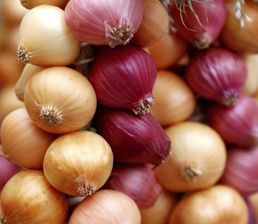Onions are a staple in our kitchen. The kids and I LOVE onions of all types. We add onions to almost all our dishes. Onions are inexpensive and I use them generously in my dishes. For fried rice and noodles, I sometimes skip the meat and flavor the dish with loads and loads of onions, garlic, scallions, eggs and vegetables. The pungent aroma of the onions and garlic give an appetizing lift to the fried rice and fried noodles.
Onions are part of the allium family of vegetables and herbs, which also includes chives, garlic, scallions and leeks.
Allium vegetables have been cultivated for centuries for not only their characteristic, pungent flavors but also for their medicinal properties.
Onions can vary in size, shape, color and flavor. The most common types are red, yellow and white onion. Flavors can vary from sweet and juicy with a mild flavor to sharp, spicy, and pungent, often depending on the season in which they are grown and consumed. It is estimated that 105 billion pounds of onions are harvested each year worldwide.

Cry me a river…
Onions are nothing to cry over — these flavorful bulbs are packed with nutrients, though I will shed loads of tears when I peel onions. To reduce the production of this compound, chill the onions for half an hour or so before cutting to reduce the activity of the enzyme.
The onion’s revenge…
The smell of onions can be a problem, both on the hands and on the breath. After chopping onions, try rinsing the hands with cold water, rubbing them with salt, rinsing again and then washing with soap and warm water. To remove the smell from breath, eat a few sprigs of parsley or an apple to help conceal the odour.
Health Benefits
The possible health benefits of consuming onions include lowering the risk of several types of cancer, improving mood and maintaining the health of skin and hair.
Cancer: Allium vegetables have been studied extensively in relation to cancer, especially stomach and colorectal cancers. Their beneficial and preventative effects are likely due in part to their rich organosulfur compounds. Although the exact mechanism by which these compounds inhibit cancer is unknown, possible hypothesis include the inhibition of tumor growth and mutagenesis and prevention of free radical formation.
Onions are also a source of the strong antioxidant vitamin C that helps to combat the formation of free radicals known to cause cancer.
Colon cancer: High fiber intakes from all fruits and vegetables are associated with a lowered risk of colorectal cancer.
Prostate cancer: In a study published by the Journal of the National Cancer Institute, researchers used a population-based, case-controlled study to investigate the relationship between allium vegetable intake and prostate cancer. They found that men with the highest intake of allium vegetables had the lowest risk for prostate cancer.
Esophageal and stomach cancer: Frequent intake of allium vegetables has been inversely related with the risk of esophageal and stomach cancer. Several survey-based human studies have demonstrated the potential protective effects of consuming alliums, as well as reports of tumor inhibition following administration of allium compounds in experimental animals.
Sleep and mood: Folate, found in onions, may help with depression by preventing an excess of homocysteine from forming in the body, which can prevent blood and other nutrients from reaching the brain. Excess homocysteine interferes with the production of the feel-good hormones serotonin, dopamine, and norepinephrine, which regulate not only mood, but also sleep and appetite as well.4
Skin and hair: Adequate intake of vitamin C is needed for the building and maintenance of collagen, which provides structure to skin and hair.

Health risks
While not especially serious, eating onions can cause problems for some people. The carbohydrates in onions may cause gas and bloating, according to National Digestive Diseases Information Clearinghouse. Onions, especially if consumed raw, can worsen heartburn in people who suffer from chronic heartburn or gastric reflux disease, according to one 1990 study in the American Journal of Gastroenterology.
Eating a large amount of green onions or rapidly increasing your consumption of green onions may interfere with blood thinning drugs, according to the University of Georgia. Green onions contain a high amount of vitamin K, which can decrease blood thinner functioning.
It is also possible to have a food intolerance or an allergy to onions, but cases are rare, according to an article in the Journal of Allergy and Clinical Immunology. People with onion allergies may experience red, itchy eyes and rashes if an onion comes into contact with the skin. People with an intolerance to onions may experience nausea, vomiting and other gastric discomfort.
